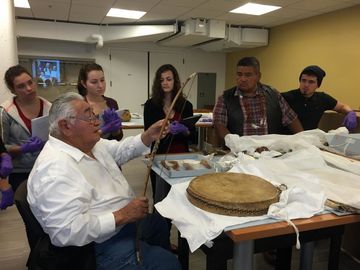For Tribes & Descendent Communities
Access to Collections

The Stanford University Archaeology Collections are available to many stakeholder communities. In particular, we warmly invite input from descendant communities regarding collections and their care.
While the majority of SUAC collections are currently not available online, detailed information about the existing archaeological, anthropological, and archival holdings can be obtained by contacting us.
SUAC respects that control over understandings known as “traditional knowledge” and/or “intangible heritage” rests with the individual and collective keepers of that heritage, as defined by originating communities. We acknowledge the historic harm alienation from this knowledge has done and continues to do. We also acknowledge that Stanford continues to benefit through access to this knowledge and materials through which it manifests, as do those privileged to work with these materials. We warmly welcome guidance and open dialogue on these matters and remain committed to fostering a collaborative and respectful relationship with all communities involved.
Repatriation & NAGPRA
Stanford University fully complies with federal repatriation legislation and embraces the ethics and spirit of repatriation law. These imperatives impact both the SUAC collections and collections at the Cantor Arts Center. The Director of Heritage Services oversees compliance with the Native American Graves Protection and Repatriation Act on behalf of the university as a whole.
Tribes interested in repatriation are invited to ljones [at] stanford.edu (subject: Re%3A%20Repatriation) (contact the Director of Heritage Services), suarchcoll [at] stanford.edu (subject: Re%3A%20Repatriation) (email us), or use SUAC's contact form to consult further. We will be happy to hear from you and to begin these important conversations.
For more information on repatriation efforts at Stanford:
- National NAGPRA: Notices of Inventory Completion published by Stanford in the National Register
- National NAGPRA: Notices of Intent to Repatriate published by Stanford in the National Register
- National NAGPRA: Culturally Unidentifiable Native American Inventory Database, click "Select a Museum/Agency" then select "Stanford Univ., Heritage Services (formerly Archaeology Center" from the drop down list
- National NAGPRA: Summaries Database, select state "CA" and type "institute/museum" from the drop down list, then select "Stanford Univ., Dept. of Anthropology" or "Stanford Univ., Museum of Art" from the drop down list
- International repatriation to Waipapa marae in Käwhia, New Zealand